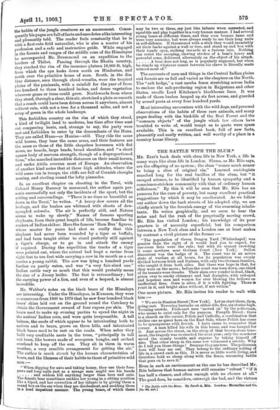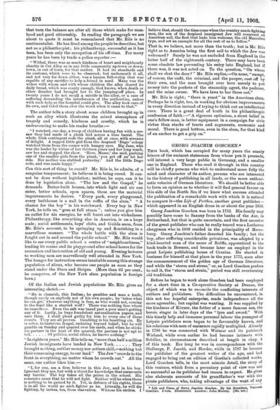THE BATTLE WITH THE SLUM.*
Mn. Rue's book deals with slum life in New York, a life in many ways like slum life in London. Slums, as Mr. Riis says, are the offspring of no system ; the slum "comes much nearer to being a slice of original sin." Learned sociologists searched long for the real bacillus of the slum, but "it escaped science, to be identified by human sympathy and a conscience-stricken community with that of ordinary human selfishness." By this it will be seen that Mr. Riis has no panacea for the cure of poverty, but many excellent practical suggestions by which it may be ameliorated. As we follow our author down the back streets of his adopted city, we are chiefly struck by the feverish energy of the swarming inhabi- tants. He writes graphically, and we seem to hear the noise and feel the rush of the perpetually moving crowd. Mr. Riis has visited London ; his knowledge of its poor quarters is of necessity superficial, but his comparison between a New York slum and a London one at least makes by contrast a vivid picture of the former :— " The population of Green Dragon Yard [Whitechapel] was greater than the sight of it would lead you to expect, for one-room flats were the rule; but with its utmost crowding it came nowhere near Gotham Court [New York]. Sullen discontent was the badge of it. The court was in an active state of warfare at all hours, for its population was evenly divided between Irish and Italians, with only two German families, who caught it from both sides. But there was hope in that, for they were on the move ; before the court was torn down, one-third of its tenants were Greeks. Their shim over yonder is dead, black, given over to smoky chimneys and bad draughts, with red-eyed and hopeless men and women for ever blowing the bellows on ineffectual fires. Ours is alive, if it is with fighting. There is yeast in it, and bright skies without, if not within."
One more picture. Mr. Riis invites his reader to walk with him :—
" We are in Stanton Street [New York]. Let us start there, then, going east. Towering barracks on either side, five, six stories high. Teeming crowds. Push-cart men moved on' by the policeman, who seems to exist only for the purpose. Forsyth Street: there is a church on the corner, Polish and Catholic, a combination that strikes one as queer here on the East Side, where Polish has come to be synonymous with Jewish. I have cause to remember that corner. A man killed his wife in this house, and was hanged for it. Just across the street, on the stoop of that brown-stone tene- ment, the tragedy was re-enacted the next year; only the murderer saved the county trouble and expense by taking himself off also. That other stoop in the same row witnessed a suicide. Why do I tell you these things ? Because they are true. The policeman here will bear me out. They belong to the ordinary setting of life in a crowd such as this. It is never so little worth living, and therefore held so cheap along with the fierce, unceasing battle that goes on to save it."
Even in such an environment as the one he has described Mr. Riis believes that human nature still remains " robust " "if it has half a chance, and often enough with no chance at all."
The good does, he considers, outweigh the bad, and the virtual
• The Batth with the Shim. By Jacob A. Bile. London g MsamiUsa and Co. Pe. *1. set.1
that turn the balance are after all those which make for man- hood and good citizenship. In reading the paragraph we are about to quote it must be remembered that Mr. Riis is no sentimentalist. He has lived among the people he describes, but not as a philanthropist; his philanthropy, successful as it has been, has been only the occupation of his off-time. For many years be has been by trade a police reporter :—
" Withal, there was as much kindness of heart and neighbourly charity in Cat Alley as in any little community up-town or down- town, or out of town, for that matter. It had its standards and its customs, which were to be observed; but underneath it all, and not very far down either, was a human fellowship that was capable of any sacrifice to help a friend in need. Many was the widow with whom and with whose children the alley shared its daily bread, which was scanty enough, God knows, when death or other disaster had brought her to the jumping-off place. In twenty years I do not recall .a suicide in the alley, or a case of suffering demanding the interference of the authorities, unless with such help as the hospital could give. The alley took care of its own, and tided them over the worst when it came to that."
The author tells a story about some children brought up in such an alley which illustrates the mixed atmosphere of tragedy and comedy, kindness and cruelty, which he is endeavouring to make his reader breathe :— "I watched, one day, a troop of children having fun with a see- saw they had made of a plank laid across a lime barrel. The whole Irish contingent rode the plank, all at once, with screams of delight. A ragged little girl from the despised 'Dago ' colony watched them from the corner with hungry eyes. Big Jane, who was the leader by virtue of her thirteen years and her long reach, saw her and stopped the show. 'Here, Manic,' she said, pushing one of the smaller girls from the plank, you get off an' let her ride. Her mother was stabbed yesterday.' And the little Dago rode, and was made happy."
Can this sort of thing be cured P Mr. Riis is, he admits, of a sanguine temperament; he believes it is being cured. It can- not be done without legislation; neither, he says, can it be
done by legislation alone. "The law and the Gospel," he demands. Better-built houses, into which light and air can enter, better schools, open spaces, these are the material improvements he desires. "Every park, every playground, every bathhouse is a nail in the coffin of the slum." "A chance for the boy" is his watchword. Every boy in New York, be tells us, "goes at full steam " ; unless you give him an outlet for his energies, he will burst out into wickedness. Philanthropy, like everything else in America, is on a huge
scale; social settlements, boys' clubs, and Guilds seem, from Mr. Riis's account, to be springing up and flourishing in a marvellous manner. "The whole battle with the slum is fought out in and around the public school." Mr. Riis would like to see every public school a centre of "neighbourliness," lending its rooms and its playground after school hours for the
recreation and instruction of old and young. Evening lectures to working men are marvellously well attended in New York.
The hunger for instruction seems insatiable among this strange population of aliens, who become one people as soon as they stand under the Stars and Stripes. (More than 62 per cent., he computes, of the New York slum population is foreign born.) . Of the Italian and Jewish populations Mr. Riis gives an interesting sketch :—
• " He is clannish, this Italian; he gambles and uses a knife, though rarely on anybody not of his own people; he takes what he can get,' wherever anything is free, as who would not, coming to the feast like a starved wolf ? There was nothing free where he came from. Even the salt was taxed past a poor man's getting any of it. Lastly, he buys fraudulent naturalisation papers, and uses them. I shall plead guilty for him to every one of these Counts. They are all proven. Gambling is his besetting sin. He is sober, industrious, frugal, enduring beyond belief; but he will gamble on Sunday and quarrel over his cards, and when he sticks his partner in the heat of the quarrel, the partner is not apt to
tell Of polities, social ethics, he knows nothing."
"In eighteen years," Mr. Riis tells us, "more than half a million
Jewish immigrants have landed in New York They brought nothing, neither money nor artisan skill,—nothing but tlieir consuming energy, to our land." The Jew " crowds to the front in everything, no matter whom he crowds out." All the same, our author likes him ;—
" I, for one, am a firm believer in this Jew, and in his boy. Ignorant they are, but with a thirst for knowledge that surmounts any barrier. The boy takes all the prizes in the schooL His comrades sneer that he will not fight. Neither will he when there is nothing to be gained by it. Yet, in defence of his rights, there is in all the world no such fighter as he. Literally, he will die fighting, by inches, too, from starvation. " Witness his strikes. I believe that, should the time come when the country needs fighting men, the son of the despised immigrant Jew will resurrect on American soil, the first that bade him welcome, the old Mace-abeo type, and set an example for all the rest of us to follow."
That is, we believe, not more than the truth; but is Mr. Riis right as to America being the first soil to which the Jew was
welcomed P Surely he was not excluded from England in the latter half of the eighteenth century. There may have been some obsolete law preventing his entry into England, but if there was, it was not acted on. To the question, "On whom shall we shut the door P" Mr. Ras replies,—On none," except, of course, the unfit, the criminal, and the pauper, cast off by their own, and the man brought over here merely• to put money into the pockets of the steamship agent, the padrone, and the mine owner. We have laws to bar these out."
Mr. Riis is right; "there is yeast" in the American slum.
Perhaps he is right, too, in working for obvious improvements in every direction instead of trying to think out an intellectual cure. There is a great deal of truth in his philanthropic confession of faith:—" A vigorous optimism, a stout belief in one's fellow-man, is better equipment in a campaign for civic virtue than stacks of tracts and arguments, economic and
moral. There is good bottom, even in the slam, for that kind of an anchor to get a grip on."







































 Previous page
Previous page